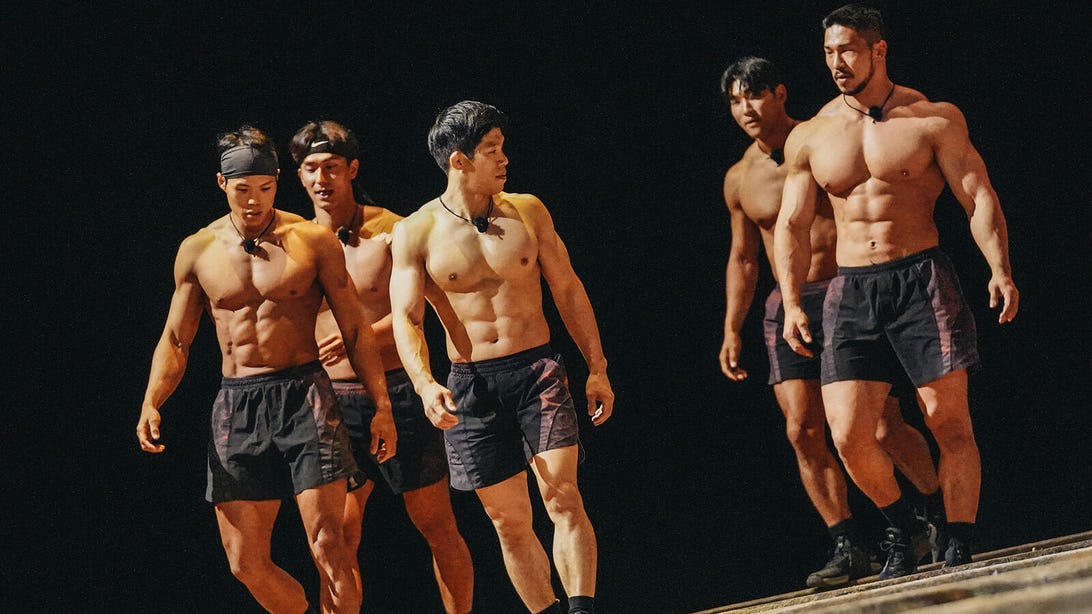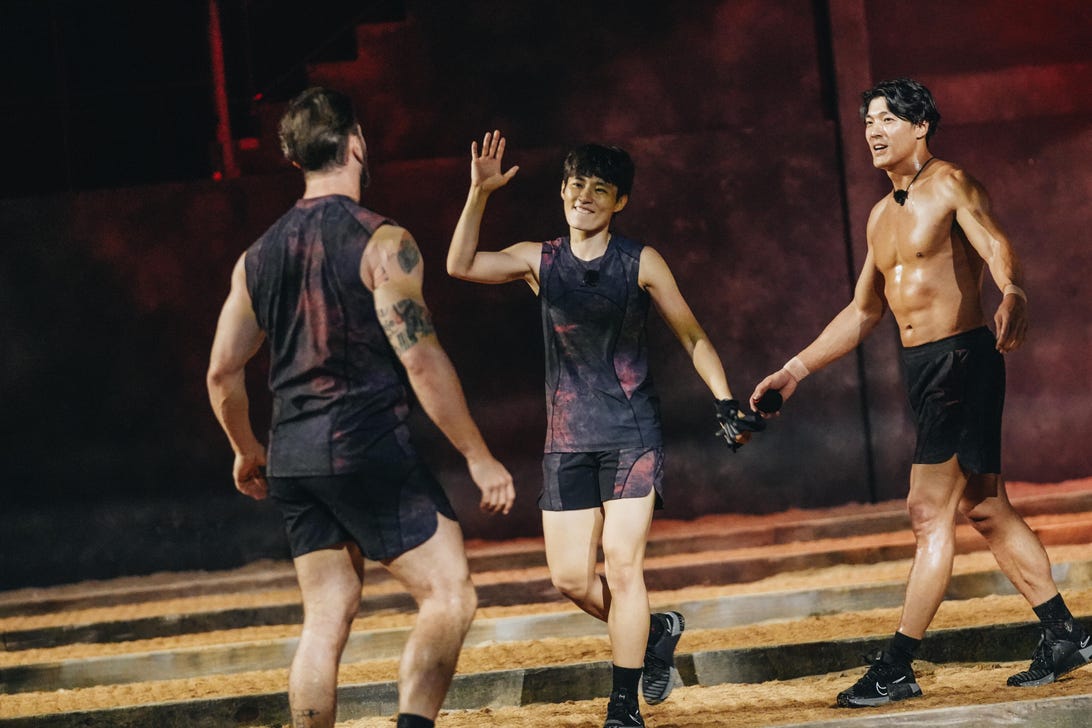Join or Sign In
Sign in to customize your TV listings
By joining TV Guide, you agree to our Terms of Use and acknowledge the data practices in our Privacy Policy.
Physical: 100 Season 2 Producer Says 'Really Muscular Characters' Advancing May Have Overshadowed Other Traits
Jang Ho-gi was surprised when the 'Avengers' team formed and calls it a 'rather cold' decision

Amotti, Kim Jee-hyuk, Jung Ji-hyun, Lee Jang-kun, Kim Min-su, Physical: 100 Season 2
Netflix[Warning: The following contains spoilers for the Season 2 finale of Physical: 100. Read at your own risk!]
In many ways, it's clear that the Physical: 100 producers took feedback from the show's first season and implemented changes in Season 2. For one, the reality competition series' new installment, titled Physical: 100 Season 2 — Underground, gave screen time to its finalists. (As I wrote last year, heading into Season 1's finale, I repeatedly wondered, "Who is he?" and thought, "I simply do not know anything about this man" about some of the remaining contestants.) But Physical: 100 Season 2 changed that. The four contestants who stood before the ultimate quest — CrossFitter Amotti, former national rugby team player Andre Jin, actor Justin Harvey, and former firefighter and special forces soldier Hong Beom-seok — each had their share of confessionals throughout the show. It was a welcome change to click "Play" on the last episode being able to root for contestants.
This makes it more head-scratching that, in comparison to last season's quests, those in Underground seem more unbalanced. Physical: 100 is built on the premise that it can "find the peak human form, the perfect body" through evaluating different physical traits, including speed, endurance, agility, balance, and strength. And whereas last season's challenges appeared to test a wider range of attributes, strength is ostensibly the dominant trait required for most of Season 2's quests. It's something producer Jang Ho-gi, who worked on both seasons of the show, is aware of. "Especially because more of the really muscular characters, they were the ones who usually advanced [in Season 2]— I do understand how people could see it that way," Jang said. But he emphasized that the quests in Underground were not designed to measure who has the biggest muscles.
In an interview with TV Guide, Jang discussed, via a translator, the vision behind different challenges and how the results of quest 2.5 — where victor Jung Ji-hyun formed a new group of contestants nicknamed the "Avengers" — surprised him.
Physical: 100 Season 2 Winner Opens Up About Devastating Car Accident in 2021: 'I Thought I Might Never Walk Again'

Justin Harvey, Lee Hyun-jeong, Lee Jae-yoon, Physical: 100 Season 2
NetflixHow did the producers come up with the three parts of the final quest?
Jang Ho-gi: Because it was the finals, I felt like it didn't have to favor any particular strength. For example, in the first round of the final quest, it's more focused on the upper body strength, the second round is more focused on lower body strength, and then the third one requests full body strength plus willpower. Also, we needed to make sure that the final quests would fit the overall theme of the "Underground" world that we had, and to make sure that it was a lot more intense than Season 1.
In the final quest, both the holding torso challenge and the infinite squats challenge were personalized to contestants' weight and height with the goal of making things more fair. Why weren't more of the earlier quests also personalized to make things more balanced for contestants who are smaller, most of whom are women?
Jang: It wasn't that we didn't have those things in mind in designing the former quests. However, the principle of our show is that we do not discriminate [against] different characteristics of whoever is participating — gender, weight class, it's not something we discriminate against. Inevitably for each quest, some people are going to be more in favor. However, what we needed to make sure [of] was that all of the quests were doable physically for everybody that's participating.
I think it'd be great if you could look at it from an entire-cast-as-one-package kind of perspective, where each of the quests requires sometimes absolute strength, sometimes relative strength. Sometimes you have to be able to continue and finish the quest even if you're at a disadvantage. We were trying to find the ultimate physique who can go through all of these tests, despite which characteristic each quest had. And we know that for the final quest, it was more about the relative strength between the remaining contestants. But in the former quests, we didn't have a choice but to also look into and measure absolute strength as well.
There's a lot of discussion about how this season appears to have more quests where absolute strength is a major factor. We know endurance is required for the maze conquest and the cart haul on the tracks, but strength is still a big part. Did you feel like this season's quests prioritized strength over other traits like agility and balance, which were also highlighted in Season 1?
Jang: I admit that to some extent — and especially because more of the really muscular characters, they were the ones who usually advanced — I do understand how people could see it that way. However, if you really take a closer look at each of the quests' design, the pre-quest was about running, and for the maze as well, it could be a little bit more advantageous for people with a smaller physique because it allows them to move quicker. And in terms of the team delegation where you had to push the weight as you were hanging on the monkey bars, as well as the underground cart push, it could require more strength because it was heavy, but also you could go back and forth more rounds if you were faster.
I know this time around a lot of the contestants that were really muscular tended to participate more throughout. And because of that, I think the overall narrative was going in that sort of flow. However, when we were designing each of the quests, what was at the top of mind was making sure that people who had a wider range of different types of strengths all had a chance to advance after each quest. At the end of the day, when you see the results, because a lot of the muscular-strength type people advance[d], I do feel like it did shadow a little bit the other types of strengths. However, if you look at the overall process of choosing the final winner, I do not think that our show was all about measuring who has the biggest muscles.
More on Netflix:
That's helpful to know. I also wanted to ask about quest 2.5 for eliminated contestants. For that one, fighting for the pillars, were you and other producers worried about women having a much lower chance at excelling in the quest?
Jang: Statistically speaking and probability wise, because we were bringing one person out of 25 people back, we did think about how inevitably those with the smaller physique, which a lot of women will fall under, it may not be easy for them. But we were thinking about how when there is the one person out of the 25, there was a chance of them bringing back their entire former team, and that would give a chance for other people as well. In a way we thought that it could be more of a mind game type of situation where they would feel pressure, they would want to choose [new teammates] or go with their former teams. However, this season, the passion and the yearning for winning was so strong, it did lead to a rather cold, if you will, decision on the winner's part. And that's something that we were actually quite surprised by too, and also something that I thought could have gone a different way.
One of the very difficult things was, the basis of our program is that we are exploring what it means to have the "perfect" or the "ultimate" physique. And in that sense we are exploring a lot of different methods along the way. And after Season 1, there was a lot of response from the viewers about strength, or the quests being too relative to one another in terms of the contestants. And we did try to reflect that a little bit in designing the quests this time around. So I hope that you could see this season as a piece in the overall puzzle of trying to explore that question.
All episodes of Physical: 100 Season 2 are available to stream on Netflix.
